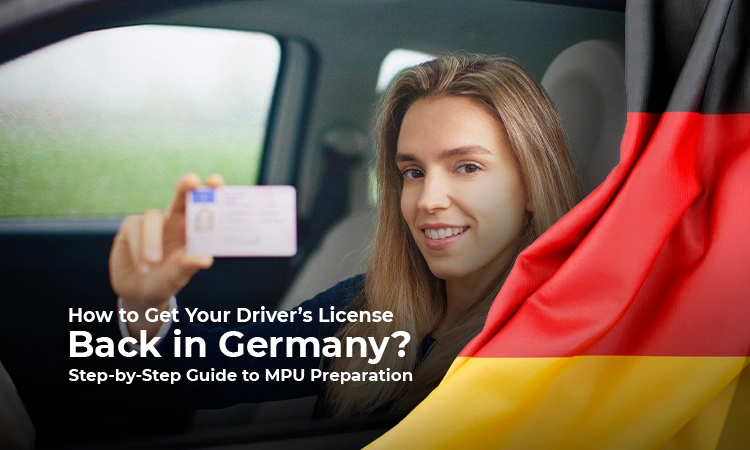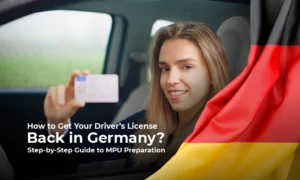How to get your driving license back in Germany? Step-by-step preparation for MPU
Losing your driving license in Germany is a serious matter – especially if the cause was alcohol, drugs, exceeding the penalty point limit or other traffic violations. In many cases, in order to regain your driving license, it is necessary to undergo the so-called MPU – Medizinisch-Psychologische Untersuchung , or medical-psychological examination of drivers. For many people, this is a stressful and unknown experience. But don’t worry – proper preparation significantly increases the chances of success at the first attempt.
What is MPU?
MPU is a specialist diagnostic procedure to assess whether a person is fit to drive again. The test consists of several elements:
- Psychological interview
- Medical exams
- Laboratory tests (e.g. for alcohol, drugs)
- Sometimes also fitness tests
The MPU result can be positive, conditional or negative . A negative result means that the driving license will not be reinstated and the whole process will have to be repeated – often after several months.
Who needs to undergo MPU?
MPU may be imposed in situations such as:
- Loss of driving license due to blood alcohol level above 1.6‰
- Driving under the influence of drugs
- Accumulating too many penalty points in Flensburg’s system
- And other cases where the office has doubts about the driver’s ability to
drive safely
Why is it worth preparing?
MPU is not a formality – it is a demanding process that often ends in failure for those who are not prepared. On the other hand, professional preparation significantly increases the chances of a positive result . Examiners expect specific attitudes, self-reflection and a change in behavior – it is not enough to say “I will not do it again.”
How does preparation for MPU look like? The whole truth about what awaits you
Preparing for MPU isn’t about learning ready-made answers. It’s a process that takes time, reflection, and a willingness to change. For many, it’s an emotional journey—difficult, but necessary. Here’s what the road to getting your license back really looks like.
Confrontation with one’s own history
The first step is to face your past. You can’t approach the MPU without understanding why you lost your license. You have to ask yourself difficult questions: What led to this situation? What were my behaviors? Was it a one-time mistake or something that has been happening for a long time? It’s not enough to say “I don’t drink anymore” or “never again.” Examiners expect specific reflection.
You have to figure out for yourself what went wrong and why. And not just to convince them – but to really understand yourself.
Developing a change plan
After this confrontation comes the moment when you have to do something about it. Changing your lifestyle, habits, approach to responsibility – these are not just declarations, but specific actions. Sometimes this means breaking away from your old company, limiting alcohol, starting therapy, changing your job or daily rhythm. In this phase, it is important that everything you do is consistent with what you later say during the examination.
Examiners have a lot of experience – they can sense when someone is saying what they want to hear and when something has really changed.
Formalities, offices, documents
At the same time, you have to take care of official matters. Collecting documentation is often a painful process: certificates, applications, administrative decisions, letters from the office. You have to know when and where to submit applications, how to communicate with the Führerscheinstelle, what deadlines to observe.
It is time-consuming and easy to get lost in it – especially since each case may require something different. Sometimes you have to wait for the office’s consent to join the MPU, other times you have to immediately look for an appointment at the testing facility.
Medical tests and laboratory tests
If the reason for losing your driving license was alcohol or drugs, you cannot do without tests. The most common are:
- Blood tests (CDT) – show alcohol consumption in the long term
- Urine or hair tests (EtG) – detect abstinence or presence of alcohol/drugs
- Medical examinations – general health, symptoms of addiction or lack thereof
You have to not only do them, but also plan them in time, because the result is only important for a certain period (e.g. 3 months). Some people have to go through a full program of documented abstinence, which means, for example, four tests spread over half a year or longer.
Meeting with MPU psychologist
The most stressful moment for many is the conversation with a psychologist. This is not an interrogation, but an honest conversation that lasts from 45 minutes to even 90 minutes. The psychologist will want to know:
- What were the circumstances of losing your driving license?
- What was your life like back then?
- What has changed since then?
- What actions have you taken to prevent this from happening again?
- How do you understand your responsibility as a driver today?
It’s not about being perfect. It’s about authenticity, logic and honesty. The examiner doesn’t evaluate the past, but whether you’ve understood your mistake and whether you can’t repeat it. If someone tries to cover up the facts or “schemes”, the chances of a positive result drop dramatically.
Emotions, stress and working on yourself
Preparing for MPU is not only about formalities and knowledge – it is also emotional work on yourself. Many people go through shame, anger, fear or frustration. There is doubt, fatigue, rebellion. But this is part of the process – because MPU is not a punishment, but an opportunity. And this must be understood.
It’s not easy – but possible
MPU is not an easy exam to pass. It is a verification of your readiness to safely participate in road traffic . It requires courage, time and consistency. But if you treat it seriously, honestly and maturely – you have a real chance to get your driving license back.
The applications needed to start the MPU procedure can be found here:
If you want to contact our specialist – click here:
www.sparamt.de/pomocmpu





